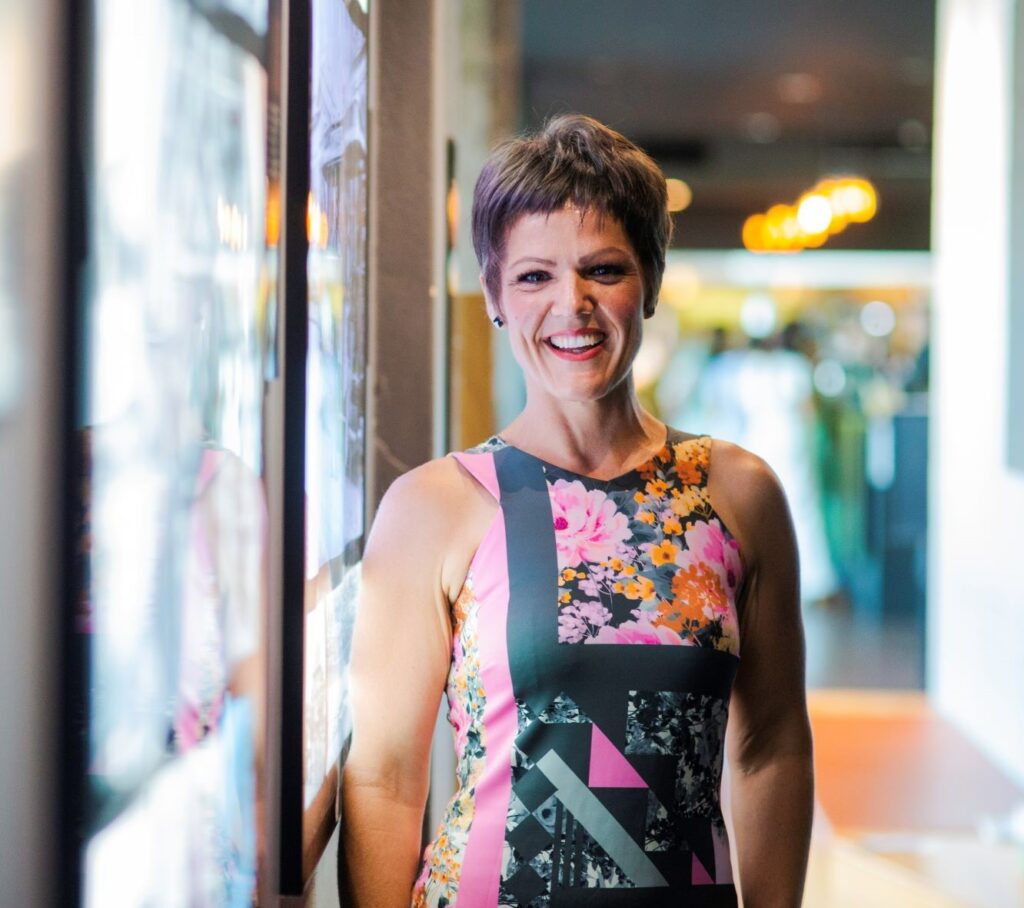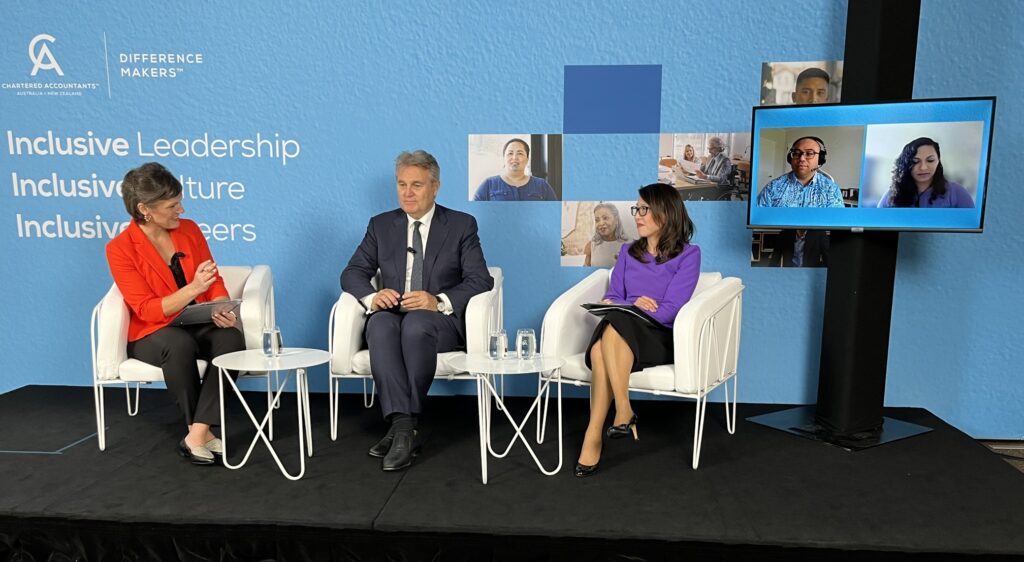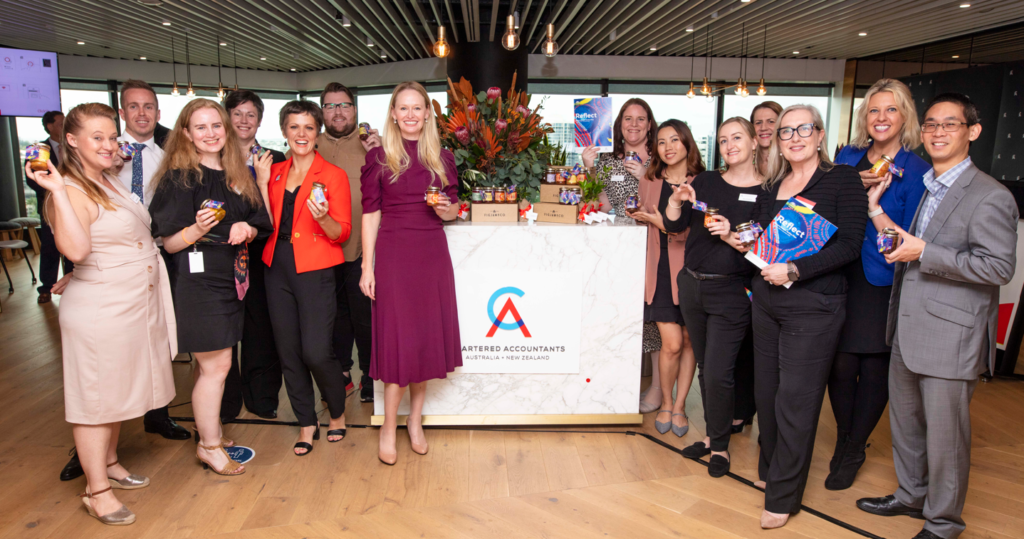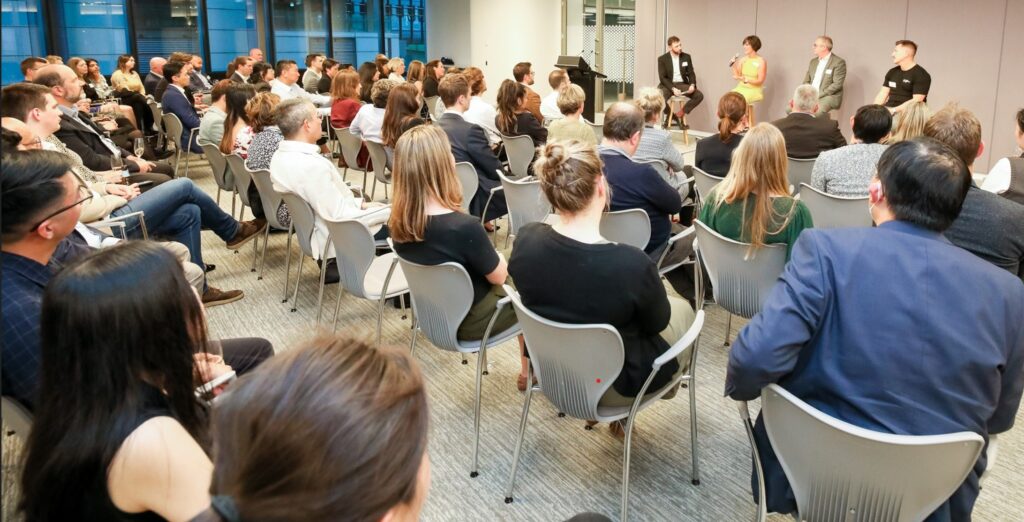In our second segment of this special series, our head of diversity, culture and inclusion, Angelina Pillai chats with Hayley Angell from the Chartered Accountants, Australia and New Zealand (CA ANZ). Hayley leads CA ANZ’ global Diversity, Equity and Inclusion (DEI) Strategy and CA ANZ’ Reconciliation Action Plan (RAP).
What does equity mean to you?

The way I think about it – and maybe I am a bit single-minded right now training for my first triathlon… but stick with me! Ha! – is acknowledging we’re not all starting from the same start line, the hurdles are different heights and we’re not all running the race with the same resources and support. Equity isn’t about penalising anyone or taking supports away or pointing fingers; it’s about identifying, addressing and minimising where there are higher barriers, looking for ways to narrow the gaps in starting positions and connecting resources and support where they are lacking. We’re ultimately talking about fairness.
The accounting profession has achieved near equality in terms of gender participation, which is something to celebrate and is illustrative of both men and women showing up and challenging barriers. And while there is near parity in numbers, there remain hurdles which see differences in outcomes, evident through metrics like the gender pay gap.
For example, we know those with care responsibilities generally require greater flexibility around work patterns – therefore – inflexibility is a likely barrier for those with care responsibilities. What care responsibilities don’t impact is the capability or potential of the athlete, nor would offering flexibility penalise anyone else in the race. Thus, flexibility becomes a lever for equity.
It’s for us in the professions and for leaders to think about, understand and work to minimise these barriers, rather than the athletes themselves addressing and dismantling these inequities mid-race.
How are issues of gender, neurodiversity and First Nations’ relationships celebrated/addressed in your professions, through your professional association?
A safe, diverse and inclusive profession is key for CA ANZ.

Gender Diversity
I’ve mentioned already that gender representation in the profession is certainly something to be celebrated and, in fact, slightly more women than men make up our Provisional Membership – those currently undertaking the CA Program. A sustainable profession is one that is attractive to all talent, so gender parity is great to see, and we’re learning more about non-binary and gender-diverse experiences through our major member surveys.
A key initiative is our Remuneration Survey – always topical and especially in the COVID/post-COVID salary landscape. With such a strong data set (some 7,700 members participate) it’s a powerful indicator of salaries across roles, level, experiences and geography. Naturally, the survey has informed our advocacy thought leadership on the gender pay gap – we saw a 4% drop in the gender pay gap in both Australia and New Zealand from 2021 to 2022 (Aus: 28% to 24% NZ: 34% to 30%) so it will be interesting to see if the trend continues in 2023. Watch this space.
We’re about to launch our Gender Equity Charter and Playbook, a major member and employer resource alongside our Narrowing Your Gender Pay Gap Playbook and many others. The Charter is a set of commitments CA ANZ is making to gender equity and we’re inviting firms and employers to join us in making their own commitments. The Playbook offers practical guidance and highlights best practice across organisations of various sizes and sectors, to support firms and employers on their gender equity journey with suggested initiatives, approaches and measures. Across the profession, organisations are at different stages – just as you would expect. This resource is not about calling anyone out, it is about calling all employers in to a profession-wide commitment to what gender equity looks like. I had the opportunity to garner insights from members across Australia, New Zealand and the UK and we’ve arrived at an exciting piece that I can’t wait to share.
We’ve just closed out our second Inclusion and Diversity member survey (our first survey in 2021 set the baseline for our first DEI Report and Strategy launched in 2022) we’ve had over 1,600 members tell us more about them and their experiences within the profession, with a focus on their experiences in the previous five years. With the survey having just closed, we’re about to start the process of analysis against 2021 data to get an early view of trends or changes we’ll be watching in future years. The survey includes hundreds of verbatim comments which we are keen to unpack, here are a few:
“I wish I could be proud of my disability instead of having to hide it at work.”
“My company has an active DEI program and I have found this to be more challenging than I expected. Being one of the “majority” I underestimated the difficulties that colleagues experience.”
“The more I learn about DEI, the more I come to understand how small changes can add up and make a difference. In my experience it’s often not a lack of willingness, but a lack of understanding of the practical, day-to-day challenges that prevents change.”
First Nations and Reconciliation
We celebrate the value First Nations people bring to the profession in Australia and Aotearoa New Zealand, including the meaningful contribution Aboriginal & Torres Strait Islander and Māori Chartered Accountants make to the communities, clients, and businesses they serve. We are committed to supporting Indigenous graduates and professionals on their journeys to becoming Chartered Accountants and have a number of support mechanisms in place to help address the underrepresentation of Aboriginal and Torres Strait Islander and Māori and Pasifika in the accounting profession.
In Australia specifically, CA ANZ supports the Uluru Statement from the Heart and has accepted the invitation to walk with First Nations people in a movement of all Australian people for a better future and support a First Nations Voice to Parliament enshrined in the Australian Constitution. We made this statement publicly in December 2022, with close consultation with our Aboriginal and Torres Strait Islander member panel, a panel established in 2021.
We have just completed our first stage Reflect RAP journey and are engaging with our Aboriginal and Torres Strait Islander member panel and RAP Working Group in preparation for commencing the next stage, our Innovate RAP.
We asked First Nations members to share more about their experiences as part of the Inclusion & Diversity member survey and this year – for the first time ever – we are asking members about their cultural background as part of our annual subscriptions process. Exploring the cultural diversity of our members including understanding First Nations participation is only in its early stages and we look forward to adding more richness in the way members can share their cultural background and other DEI dimensions in the future.

Centre-Left, CA ANZ CEO Ainslie van Onselen and Hayley Angell to her left.
Neurodiversity
While we do not have a specific neurodiversity plan articulated in our DEI Strategy, we are committed to building members’ DEI and inclusive leadership capabilities, establishing member ally/advocacy groups, challenging barriers to the profession and understanding and benchmarking members’ lived experiences – including neurodiversity. Our member magazine Acuity has recently featured neurodiverse members sharing their experiences and the need for breaking barriers and the opportunity of engaging with neurodivergent talent.
We would be certainly interested in the ACoP Neurodiversity survey when available.
In your view, what is the obligation of professionals to improve/support the following across professional landscapes and the professions in general? How do/can they do this?
This is fundamental obligation of the professions and professionals. The duty of a Chartered Accountant is to act in the public good. We might know of the Hippocratic Oath for doctors, or the duty of lawyers to act as officers of the courts – CA ANZ members make their commitment to conduct themselves in the interests of the public good, ‘without fear or favour’ in quite a beautiful affirmation called ‘The Charge’.
The professions have come to understand that part of the social licence to operate is being representative of the communities they serve. This includes breaking down outdated barriers that were created by elitism, so professions can attract contemporary talent. We are currently experiencing the tightest talent crisis in living memory, and in a lot of ways – like COVID catalysed and supercharged the technology-adoption and flexibility changes that were already happening – the talent crunch has multiplied DEI efforts that were already creating positive changes and breaking down barriers to the professions.
For the next generation coming through, values-led business practices and inclusive approaches are not ‘nice to have’ – they’re expected. As graduate and non-graduate talent continue to vote with their feet, employers and professions that haven’t done the work will risk relevancy and attractiveness. We recently released a major resource for members the Fresh Talent Toolkit a comprehensive recruitment and employer value proposition development guide for firms and SMEs. We layered an inclusive recruitment lens at every stage and I think what has been surprising for some is – a) how simple some adjustments are to make, and b) how much they can improve the experience and outcomes for everyone.
How do you measure diversity, equity and inclusion in your organisation?
For our members, I’ve mentioned our annual Inclusion & Diversity and Remuneration member surveys and there’s more to come as we deepen the analysis of these key data points. I’ve also spoken about the diversity dimensions we’re building into our annual subscriptions process.
One of the key ambitions of our multi-year member DEI strategy is to create an Inclusion Coalition – where member organisations and leaders mobilise together to sign an Inclusion Accord committing to a range of measurable DEI outcomes for the profession. The Inclusion Accord will ask organisations to make specific and measurable commitments on DEI for their organisation and progress will be reported and tracked annually. So, this is what we’re working towards.
For us as an organisation, we’ve committed to creating ‘a culture of Difference Makers’ with a diverse and inclusive culture for our people as part of our organisation-wide strategy. Personally – It’s what attracted me, not only to my current role, but to CA ANZ as an organisation.
How would you like ACoP to support this agenda for your professional association?
For us to be able to see what’s happening with other professions is just so useful. It’s so easy to get caught up in your own patch, so to be able to learn and share experiences with other member associations and other professions, is powerful. Inspiration, connection and collaboration – bring it on!
To hear different solutions and approaches to common issues or challenges and shining a light on success stories, is where ACoP can help for sure.

Hayley joined CA ANZ in 2020 as Queensland Regional Manager to drive engagement across the State, following key membership and partnership roles at Queensland Law Society and CPA Australia. She has 15 years’ experience as a speaker, host and facilitator working with leading global brands like Mastercard, Deutsche Bank, Virgin Media, BHP Billiton, Royal Bank of Canada, and Australia Post. Hayley has worked to re-imagine member recognition, milestones and celebrations at CA ANZ and the interplay between designation, identity and belonging. Hayley leads CA ANZ global DEI Strategy and CA ANZ Reconciliation Action Plan (RAP). Hayley has lived experience as a woman, a queer person, a person from a low-SES background and as carer to a person with a disability.